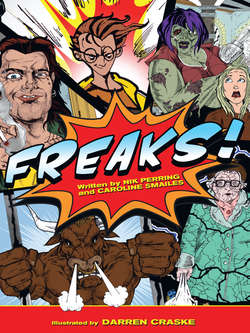Читать книгу Freaks - Darren Craske - Страница 13
Оглавление
I met her on a Saturday. Saturday the fifth of February 1994.
I was ill, too ill. They thought I’d be a danger to myself and so they locked me up in a place that was full of freaks. That’s where I met her, Sarah, she’d been locked up too.
I met her on my first night. ‘You look normal,’ she said.
‘Thanks,’ I said and we both laughed.
‘What you in for?’ she asked.
‘Stuff,’ I said and we both laughed again, because it was okay not to want to spill out your guts and it was okay to be fed up with talking.
Turns out Sarah wasn’t like me, she was happy to talk. She said it made her feel better talking ’bout it, said that the more she talked ’bout it the less likely it was to disappear. I liked that. It made sense.
That first night, Sarah explained how the doctors and nurses had got it wrong ’bout her, ’bout how she wasn’t suicidal, not even slightly. Sarah told me that she liked to fly, told me how she liked the feeling of falling with her arms outstretched, how she liked to fly to the floor. Sarah’d laughed, said the doctors thought she was depressed, manic, schizophrenic, suicidal, not quite right, said they’d wanted to clip her wings and make her normal.
‘I just like flying,’ Sarah said. ‘It’s what I was born to do.’
Over that first week, Sarah and me’d sit talking for hours. She told me all ’bout the places where she’d flown from, the ladders, the walls, the garages, the buildings. She told me ’bout how she was finding landing a bit of a bugger.
‘I keep forgetting my feet,’ she said.
She told me ’bout all the times she’d ended up in A&E and all the times that no one’d listened when she’d tried to explain that it was the landing and not the flying that was the problem.
I understood, the bit ’bout no one listening. I understood that bit, because no one’d listened to me either. No one understood why I couldn’t eat the food that they said I needed to eat to get better.
‘It’s not that simple,’ I’d said.
‘It is, just eat,’ the doctor’d said.
Six weeks later, Saturday the nineteenth of March, Sarah told me that she was itching to fly again. She told me while she was eating her tea, said how there wasn’t enough height for take-off, not anywhere on our ward. She’d tried from the cistern, but ended up banging her head on the cubicle door; she’d been concussed when the nurse’d found her.
That day, Sarah said that she needed to get out, that she’d heard, ’bout a bridge ’bout half a mile away, that it’d be her highest challenge yet. She was itching, she said, really itching. She told me that she needed to spread her wings and fly, that being cooped up was driving her mad, that flying was what she was born to do.
‘Will you cover for me? Just tell them I’m in the loo. Say I’ve got the splats,’ Sarah said and we both laughed.
Turns out no one asked me where Sarah was, I don’t even think they noticed that she’d gone, not until someone phoned. Then holy hell broke out on the ward, with nurses running around, patients being counted, lights going on in the middle of the night. Some of the inmates screamed, others sang Christmas carols; a change in routine brought out the worst in them.
I needed to find Sarah, because she’d know what was going on, she’d been cooped up on the ward for months, she’d know what to do.
I walked the ward, past the part-closed curtains, past the beds, past the other freaks, counted them, one two three four five six seven.
And then I came to Sarah’s bed.
I found a nurse there, she was packing up Sarah’s things into a Walkers Crisps cardboard box.
